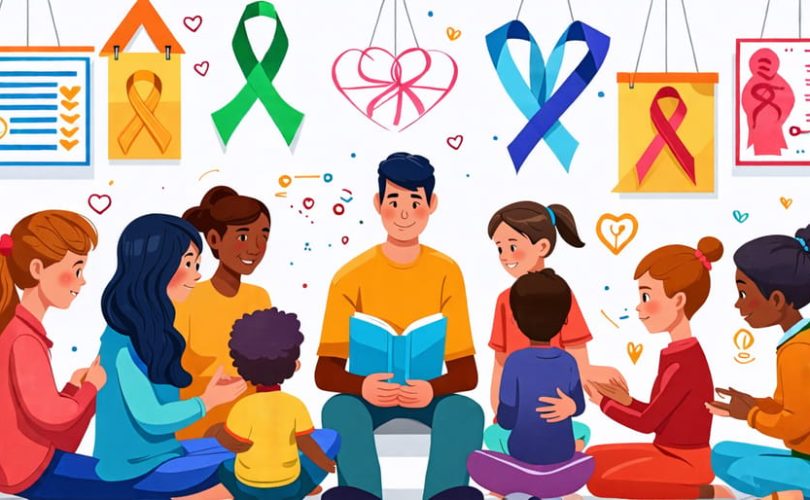Here are some powerful, concise introductory points for an article on spreading mental health awareness:
Speak openly and honestly about mental health to normalize the topic and encourage others to share their experiences. Model vulnerability by discussing your own mental health journey.
Educate yourself and others on the facts surrounding mental illness. Share research, statistics, and expert insights to combat stigma and misconceptions. Emphasize that mental health conditions are real, common, and treatable.
Support mental health initiatives in your community. Volunteer for awareness events, fundraisers, and outreach programs. Use your time and talents to amplify the good work being done.
Be a compassionate listener. When others open up about their mental health struggles, respond with empathy, validation, and support. Make it clear that you are a safe person to confide in.
Educate Yourself and Others
Common Mental Health Challenges in Children
Children can face various mental health challenges that impact their daily lives and overall well-being. Anxiety disorders, such as generalized anxiety, separation anxiety, and specific phobias, are among the most common issues. These disorders can cause excessive worry, fear, and physical symptoms like stomachaches or headaches. Depression is another prevalent concern, characterized by persistent sadness, irritability, and loss of interest in activities. ADHD, or attention-deficit/hyperactivity disorder, affects many children, leading to difficulties with focus, impulsivity, and hyperactivity. Autism spectrum disorder, a neurodevelopmental condition, can impact social interaction, communication, and behavior. It’s crucial for parents, teachers, and healthcare professionals to be aware of these challenges and provide support, understanding, and appropriate interventions. By promoting open conversations and seeking help when needed, we can work together to improve the mental health and well-being of children facing these difficulties.
Myths and Facts About Child Mental Health
Here are some common myths and facts about child mental health:
Myth: Mental health problems are rare in children.
Fact: According to the CDC, 1 in 6 U.S. children aged 2–8 years have a diagnosed mental, behavioral, or developmental disorder. Mental health issues can affect children of all ages, backgrounds, and walks of life.
Myth: Bad parenting causes mental health issues in kids.
Fact: While family environment plays a role, many factors outside a parent’s control can impact a child’s mental health, including genetics, brain chemistry, trauma, and life experiences. Most parents are doing the best they can.
Myth: Kids will grow out of mental health problems.
Fact: Without proper support and treatment, mental health issues can persist and worsen over time. Early intervention is key to helping children learn to cope and thrive.
By dispelling misconceptions, we can create a more compassionate, supportive environment for children facing mental health challenges and their families.
Encourage Open Conversations
Creating a safe, non-judgmental environment is crucial for encouraging children to openly discuss their feelings and experiences related to mental health. As a parent, teacher, or healthcare professional, you can foster this openness by actively listening without interrupting or dismissing their concerns. Show genuine interest and empathy, validating their emotions and assuring them that it’s okay to feel the way they do.
When initiating conversations about mental health, choose a quiet, comfortable setting where the child feels secure. Use age-appropriate language and open-ended questions to invite them to share their thoughts. For example, you might ask, “How have you been feeling lately?” or “I’ve noticed you seem a bit down. Do you want to talk about it?” Avoid pressuring them to talk if they’re not ready; instead, let them know you’re there to listen whenever they feel comfortable.
Sharing personal stories or examples of others who have faced similar challenges can help children feel less alone and more understood. Emphasize that seeking help is a sign of strength, not weakness, and that there are many people and resources available to support them.
Regularly check in with the child, even if they haven’t expressed any concerns. This shows that you care about their well-being and are always available to listen. By creating a safe space and initiating open, non-judgmental conversations, you can help break down the stigma surrounding mental health and encourage children to seek the support they need.


Support Mental Health Initiatives
Getting involved in mental health awareness campaigns, fundraisers, and community events is a powerful way to make a difference. By participating in these initiatives, you contribute to a collective effort that breaks down stigma and promotes understanding. Consider joining local mental health organizations or advocacy groups that organize events like walks, runs, or workshops. These events not only raise funds for essential services but also foster a sense of solidarity and support within the community.
Attending town hall meetings or speaking at school board gatherings can also help bring attention to the importance of mental health resources for children. Sharing personal stories or expert opinions can inspire others to take action and advocate for change. Remember, every voice matters in the fight against mental health stigma.
Donating to reputable mental health charities is another impactful way to support the cause. Your contributions can fund research, provide access to therapy for underserved communities, and help develop innovative treatment programs. By coming together as a community and supporting mental health initiatives, we can create a brighter future for children struggling with mental health challenges. Together, we have the power to make a lasting difference and ensure that no child feels alone in their journey towards mental well-being.
Be a Positive Role Model
Adults play a crucial role in spreading mental health awareness by modeling positive habits and coping strategies. Children often look up to the adults in their lives, so it’s essential to lead by example. This means prioritizing self-care, such as getting enough sleep, eating a balanced diet, exercising regularly, and engaging in stress-reducing activities like meditation or hobbies. When children see the adults they trust taking care of their own mental health, it normalizes these practices and encourages them to do the same.
It’s also important for adults to be open about their emotions and demonstrate healthy ways of expressing and managing them. This can involve sharing personal stories about challenges they’ve faced and how they coped, as well as acknowledging and validating children’s feelings. By creating a safe and supportive environment for emotional expression, adults can help reduce the stigma surrounding mental health issues.
Moreover, adults should be proactive in seeking help when needed, whether for themselves or for the children in their care. This may involve reaching out to mental health professionals, joining support groups, or accessing community resources. By modeling the importance of asking for help and utilizing available services, adults can encourage children to do the same when they’re struggling.
Ultimately, being a positive role model for mental health involves practicing what you preach, being transparent about your own experiences, and actively seeking support when necessary. By embodying these behaviors, adults can help create a culture of openness, empathy, and resilience that promotes better mental health for all.

Advocate for Mental Health Resources
Advocating for accessible mental health services is crucial in spreading awareness and ensuring that children receive the support they need. Start by researching existing programs and policies in your community, identifying gaps and areas for improvement. Reach out to local officials, school administrators, and healthcare providers to express your concerns and propose solutions. Attend town hall meetings, write letters, and make your voice heard.
Consider joining or starting a local advocacy group focused on children’s mental health. Collaborate with like-minded individuals to develop strategies for promoting school-based programs, such as mental health screenings, counseling services, and staff training. Support initiatives that aim to increase funding for community mental health centers and reduce barriers to accessing care.
Encourage your workplace, school, or organization to prioritize mental health by implementing supportive policies and practices. This may include flexible schedules, mental health days, and employee assistance programs. Share resources and information about accessible mental health services with colleagues and friends to help them navigate the system and find appropriate care for their children.
Remember, advocating for change takes time and persistence. Stay informed, stay engaged, and never underestimate the power of your voice in creating a more supportive and compassionate society for children’s mental health.
Conclusion
In conclusion, spreading mental health awareness is a crucial step in destigmatizing mental health issues and ensuring that children and families receive the support they need. By educating ourselves and others, engaging in open and honest conversations, supporting mental health initiatives, modeling positive behaviors, and advocating for resources, we can all play a role in creating a more compassionate and understanding society. Remember, every action counts, no matter how small it may seem. Whether it’s sharing a personal story, attending a mental health event, or simply being there for someone who is struggling, your efforts can make a profound difference in the lives of children and families affected by mental health challenges. Let us all commit to being champions for mental health awareness, working together to build a brighter, more supportive future for our children and our communities. Together, we can break the stigma and ensure that no child or family faces mental health challenges alone.







